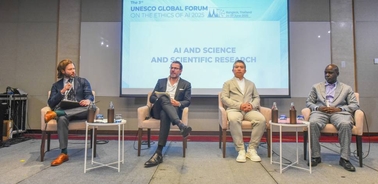Theodore Lechterman leads discussion on AI in Scientific Research at UNESCO Global Forum

Held in Bangkok, the third edition of the UNESCO Global Forum on the Ethics of Artificial Intelligence brought together international experts to the implementation of UNESCO’s comprehensive AI ethics guidelines and explore new horizons. Photo: Thailand ETDA / UNESCO.
Theodore Lechterman, Assistant Professor of Philosophy and UNESCO Chair in AI Ethics and Governance at IE University, played a key role at the UNESCO Global Forum on the Ethics of Artificial Intelligence, where he served on the program committee, chaired the research workshop, and moderated a panel on AI in science. The 3rd edition of this Forum took place in Bangkok, Thailand, convening member states, civil society organizations, businesses, and experts to review progress on implementing the landmark UNESCO Recommendation on the Ethics of AI and chart paths for expanding this work.
On June 24, Lechterman chaired a full-day workshop showcasing groundbreaking research on AI ethics, governance, and sustainability. He also met with fellow members of UNESCO AI Ethics Experts Without Borders to strategize next steps for supporting member states in implementing the UNESCO Recommendation.
Lechterman’s June 26 session, titled ‘AI in Science and Scientific Research’, explored how artificial intelligence is reshaping scientific research, discussing the opportunities that AI creates for scientific progress, as well as the emerging challenges it is posing for research integrity — and how researchers and governing bodies should respond. The panel featured leading international scientists and policy experts, including:
- Urs Gasser, Professor of Public Policy, Governance, and Innovative Technology, Technical University of Munich (TUM);
- Yi Zeng, Professor of Brain-Inspired AI and AI Governance, Chinese Academy of Sciences;
- Rana Dajani, Professor of Biology and Biotechnology, Hashemite University;
- Fadaba Danioko, Deputy Director, Mali Artificial Intelligence and Robotics Center;
- Axel Leisenberg, Policy Officer at the European Commission DG for Research and Innovation
“Though researchers face a jungle of competing norms for the use of AI in science, our panel showed that areas of convergence are emerging,” said Lechterman. “Continued progress will depend on honest, cross-disciplinary conversations like the discussion we started in Bangkok and ongoing reflection by individual researchers on what responsible science looks like in the AI age.”
UNESCO Chair senior fellow Antonio Aloisi also contributed to the Forum by presenting his research on the use of AI in Spanish legal practice during the panel on ‘AI in the Judiciary’, while Chair affiliate Iliana Grosse-Buening held bilateral meetings to strengthen connections between researchers and practitioners. These contributions cap off an exciting first year for the UNESCO Chair in AI Ethics & Governance at IE School of Humanities and further advance the growing partnership between IE University and UNESCO.
Through initiatives like the Global Forum on the Ethics of Artificial Intelligence, UNESCO fosters international cooperation by sharing the latest knowledge and experiences in AI policy and governance. The Forum informs ministers and decision-makers through multi-stakeholder dialogue, supports Member States in developing inclusive, innovative, and skills-oriented AI policies aligned with the UNESCO’s Recommendation on the Ethics of AI